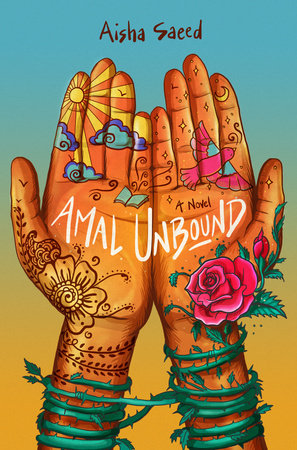
Amal Unbound
Written by Aisha Saeed
Nancy Paulsen Books, 2018, 226 pp
ISBN: 978-0399544682
Set in a tiny Punjabi village in Pakistan, Saeed’s middle-grade novel deals with the travails and trauma of a young girl who is forced into indentured servitude by a local landlord. The narrative opens with a scene in Amal’s school and establishes up front her love of learning and her aspirations to become a teacher when she grows up. Her mother is pregnant, and Amal recognizes that, as the eldest daughter, she is expected to be by her mother’s side and help her by taking care of her little sisters. She tells her teacher that she cannot stay after school to help clean the classroom because her father wants her back home. At the end of the first chapter, the reader learns that this will be Amal’s “last afternoon at school” (p.4).
As the story moves on, Saeed shows us Amal’s life at home after her mother’s childbirth. Her conservative parents are unhappy because their fifth child is also a girl, and her mother subsequently suffers from postpartum depression. As a result, Amal is forced to stay at home and take care of the chores as well as her younger sisters. One afternoon, unable to handle her sisters’ clamor and her mother’s endless silence, Amal takes off to the market. At the vegetable and fruit store, her eyes fall upon two red pomegranates and she considers them to be “the sign of hope [she] needed. A bit of sweetness after all the bitterness” (p.48). She feels happy having purchased the delicious-looking fruit, but is hit by a car as soon as she steps out of the shop. Amal is badly bruised and her groceries scattered, when the person whose car rammed into her walks up, holding her pomegranate in his hand. He offers to drop her home but asks her for the fruit, which his mother loves. She refuses to give the pomegranate, saying that “it was the last one” and is “not for sale” (p.50). “Tired of feeling powerless” and tired of denying her “own needs because someone else needed something,” she yells at him, snatches the fruit and walks away (p.50). She learns only the next afternoon that the person she had stood up against is Jawad Sahib, the village’s most powerful and ruthless landlord.
Amal learns that her father owes money to Jawad Sahib, and that this incident could complicate things for her and her family. Subsequently, the heartless landlord pays a visit to her house and declares that if her father is unable to pay back the money, Amal will need to live at his estate and work for him to pay off her father’s debts. The story then chronicles Amal’s life as an indentured servant at Jawad Sahib’s home, working as a domestic help and trying to stay out of trouble. It renders her trauma and agony in being forcefully separated from her home as well as her yearning for freedom and education. Amal Unbound ends on a happy and hopeful note, presenting the protagonist as a fighter who not only overcomes her own struggles but also liberates her fellow-indentured-servants and the villagers from the clutches of the powerful landlord and his family.
Saeed’s novel can be used in middle-grade classrooms to initiate discussions on modern slavery, gender bias, power, and the right to education. It provides a window into hierarchical structures that exist in societies globally, and serves to tell a story of a girl who questions and acts against the status quo. Amal Unbound can be paired with narratives about Malala Yousafzai including Yousafzai’s and Patricia McCormick’s (2014) I Am Malala: How One Girl Stood Up for Education and Changed the World, and Yousafzai’s and Kerascoët’s (2017) Malala’s Magic Pencil. It can also be taught along with books about strong women such as Chelsea Clinton and Alexandra Boiger’s (2018) She Persisted Around the World:13 Women Who Changed History, and with those about modern slavery such as Hidden Girl: The True Story of a Modern-Day Child Slave by Shyima Hall and Lisa Wysocky (2014).
Aisha Saeed is a Pakistani-American writer and is one of the founding members of the We Need Diverse Books initiative. Her debut novel, Written in the Stars (2015) about forced marriage, set in Pakistan is targeted towards young adult readers, and Amal Unbound is her first novel for middle-graders. Her picturebook titled Bilal Cooks Daal is due to be published in 2019. In addition to writing books for children and young adults, Aisha’s works have also appeared in the ALAN journal and the Orlando Sentinel. To learn more about her, visit http://aishasaeed.com/.
Nithya Sivashankar, Ohio State University
WOW Review, Volume XI, Issue 2 by Worlds of Words is licensed under a Creative Commons Attribution-NonCommercial-ShareAlike 4.0 International License.
Based on a work at http://wowlit.org/volume-xi-issue-2/.
